Keyword research tools are an integral part of any SEO strategy and they help in many ways. They can show you how much competition you face to rank for a particular phrase, how many people actively use a search term, trends, and keyword ideas. There’s no deficiency of tools for keyword research, and they range in value from extremely valuable to completely unhelpful.
Keyword research helps you find the right keywords to target and provide you with the data you need to rank for them when done correctly. However, you shouldn’t have to empty your bank account to access that data. So we listed out some of the best free keyword research tools out there that help you with your SEO efforts and at the same time do not burn a hole in your pocket. Read on to discover the best free keyword research tools to use in 2025.
Why is Keyword Research Important for SEO?
Keyword research gives significant understanding into the inquiries, issues, and solutions your target audience is looking for. Your content and organic strategies should be informed by this analysis, which should serve as the foundation for your SEO efforts. The first step toward successful SEO is to conduct effective research and choose the appropriate keywords.
Optimizing your website by creating content for the right keywords, you can drive organic traffic that is representative of your ideal client. Because keyword research improved your website’s rankings for their searches and your content best suited their needs, some of those people will be ready to convert. SEO is a crucial part of marketing because it helps you reach the right people with your website since organic traffic is arguably the only reliable long-term source, and equally important is hiring the right SEO services company.
You can drive the right traffic to your website, traffic that is more likely to convert, by researching the keywords people type into search engines and using this information to create targeted content.
22 Free Keyword Research Tools in 2025
WordStream – Free Keyword Research Tool
WordStream is an online advertising company based in Boston that focuses on paid search and social media. It was founded in 2007 by Larry Kim, who is now CEO of MobileMonkey. However, WordStream doesn’t simply offer paid programming and consulting services, it also gives a powerful set-up of free tools intended to assist clients with assessing their digital marketing campaign. One of these is their Free Keyword Tool, which is a free keyword tool, as the name suggests. The tool lets you see keyword suggestions based on a specific URL, industry, or location, on both Google and Bing, which is a handy bonus if you’re working on improving your Bing SEO.
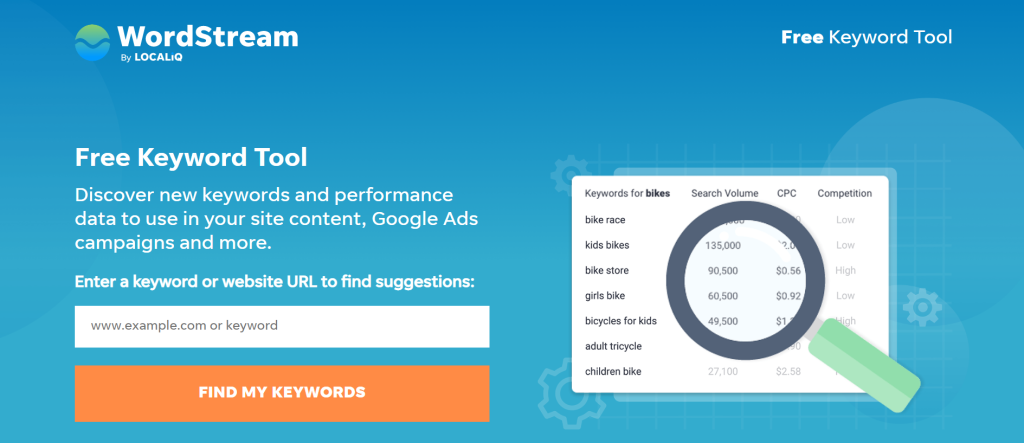
Type in your preferred keyword, set your ideal parameters and click on the “find my keywords” button to see a rundown of 25 recommended keywords quickly. You’ll likewise be shown the search volume, cost per click (CPC) and competition for every keyword on both Google and Bing.
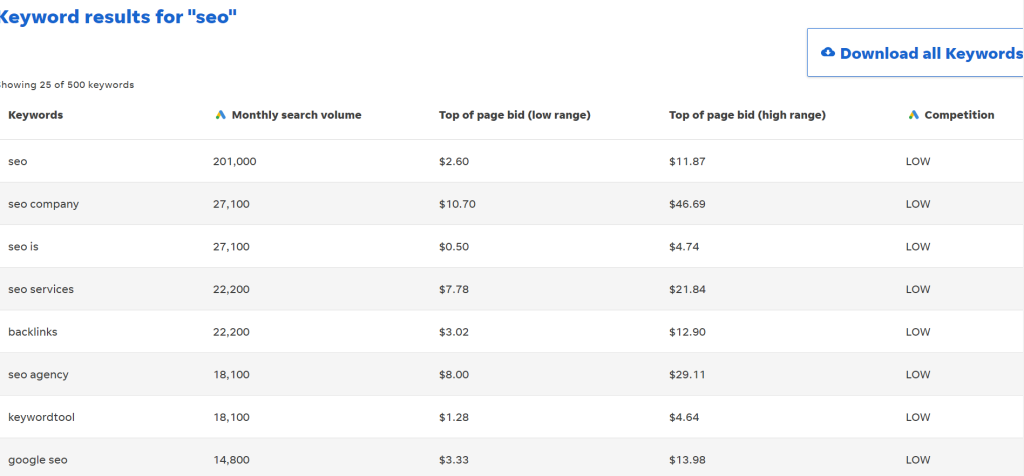
Need to see in excess of 25 keywords? Just click the orange button that says “Email all my keywords” in the upper right-hand corner of the screen, and you won’t have to pay for it. You will receive a link to download an Excel file containing all of the suggested keywords after providing your email address.
Moz’s Keyword Explorer – Free and Paid Keyword Research Tool
Moz was established as SEOmoz in 2004 by Rand Fishkin and Gillian Muessig. Today, Moz is a major SEO player with numerous paid and free software options. Keyword Explorer is without a doubt the best keyword tool for those of us who want to do truly in-depth keyword research without breaking the bank. With the free version, you can make ten queries per month, so choose carefully. Users of Keyword Explorer can search for a keyword, root domain, subdomain, or exact page, and they can also sort results by location.
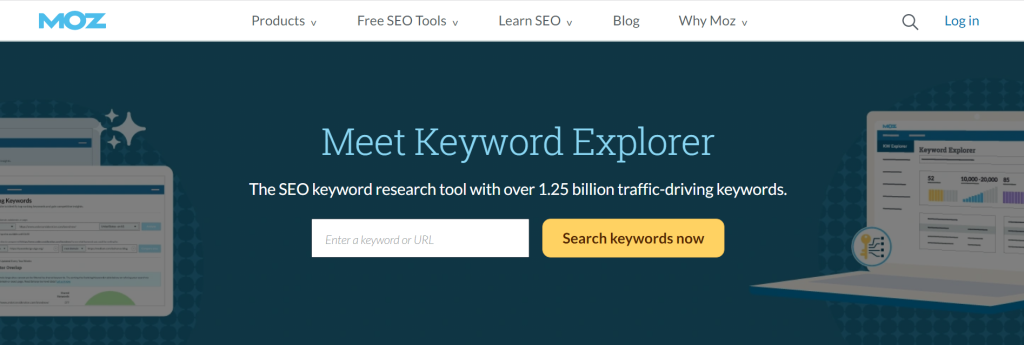
Clicking “Search keywords now” displays a variety of useful metrics, such as monthly search volume, difficulty, organic click-through rate (CTR), and more, after you have entered your chosen keyword and selected a location. To see a broad rundown of keywords, click see all ideas at the lower part of the Keyword Suggestions box. On the ensuing page, you’ll have the option to modify your results utilizing a few filters. Or, click See Full Analysis at the bottom of the SERP Analysis box if you want to see which pages are currently ranking for your chosen keyword. A comprehensive breakdown of the first page of Google’s results will be shown here.
Also Read: What Are LSI Keywords: How to Use Them to Boost Your Rankings
Ahrefs’ Keyword Generator – Comprehensive Free Keyword Research Tool
Ahrefs was founded by Dmitry Gerasimenko in 2011, but his work on search engines began much earlier. Perhaps that is the reason why Ahrefs’ index is so impressively comprehensive: it processes up to eight billion pages per day and updates its backlink catalog every 15 minutes. However, we are not here to discuss Ahrefs’ backlink index. We’re here to examine one of its many free SEO tools, a keyword tool called Keyword Generator. To use it, select the platform (Google, Bing, YouTube, or Amazon), enter your keyword, and select your preferred region.
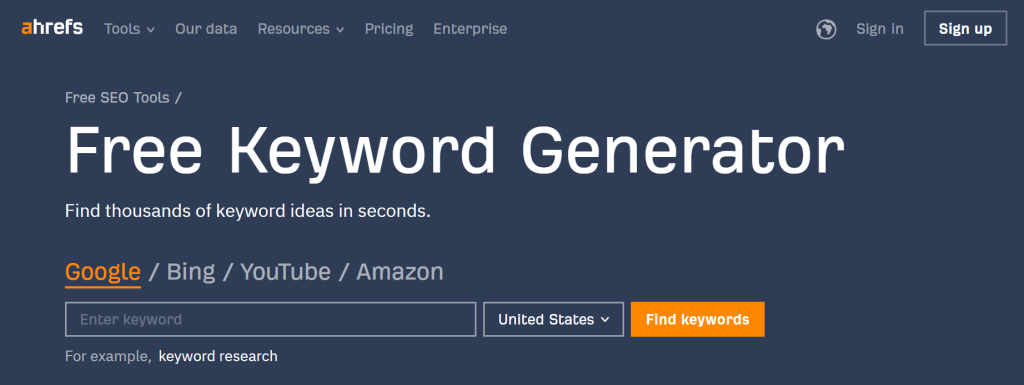
When you click the button labeled “Find keywords”, you will immediately be presented with a lengthy list of keywords. This rundown will incorporate metrics like keyword’s difficulty and volume, as well as the last time they were refreshed in Ahrefs’ file. You can also tap the questions tab to see 50 inquiries individuals are posing to about your picked keyword. A seven-day trial costs a small fee if you want to see more than 50 questions or 100 keyword suggestions.
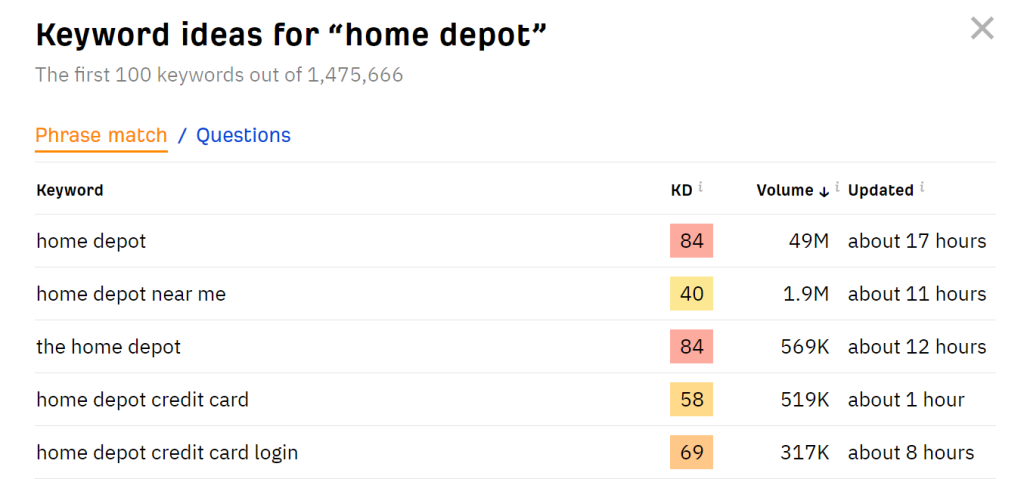

Also Read: Top 15 Ahrefs Alternatives: Free & Paid to Use in 2025
SEO Scout’s Scout Suggest – Free Keyword Research Tool
SEO Scout is a relatively new UK-based SaaS company that was established in 2019 by Jonny Platt. Tools for researching keywords, topics, and entities, split testing page copy, tracking Google rankings, locating opportunities for missing keywords, and dealing with issues of keyword cannibalization are among its products. Scout Suggest is just one of many free tools that the company provides. You can customize the results using this keyword tool by language and location, as well as select whether you want to see phrases, questions, research, and more.

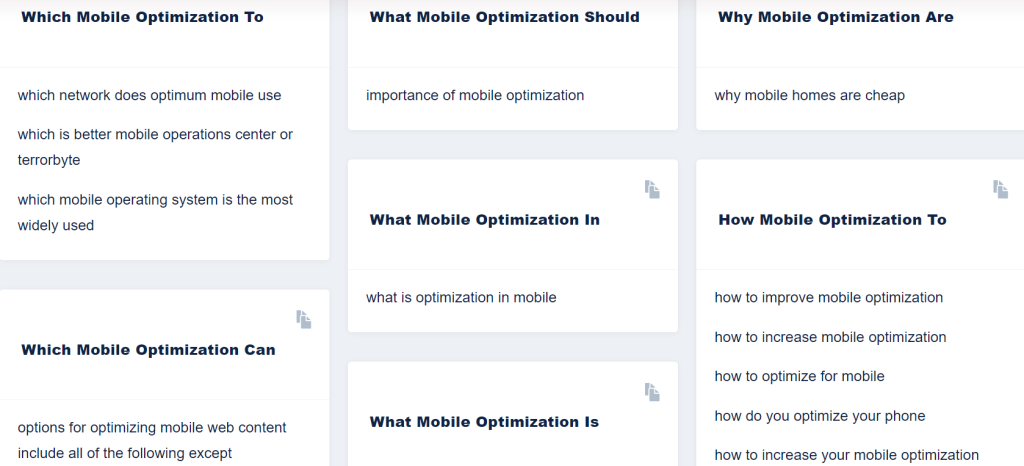
Click on “Start” after entering your preferred keyword or phrase to view the tool’s recommendations. Notice that at the top of the results, you can organize the suggestions with respect to groups, categories, or a text list. You can also sort by phrases, questions, comparisons, research, and alphabetical order under the categories tab.

Keyword Planner – Free Keyword Research Tool
Keyword Planner uses autocomplete application programming interfaces (APIs) to generate and provide data about long-tail keywords. This tool is not to be confused with Google’s product of the same name. So how does Keyword Planner contrast with Google’s keyword tool? Keyword Planner has two advantages over Google, according to them. In particular, it permits you to observe keywords that are distinct from those generated by Google and use the tool without registering. To utilize Keyword Planner, just pick your locale, enter up to five keywords isolated by commas and click on the amplifying glass button. You can also choose your favored search level, the higher the level, the more keywords will be created and the more time the inquiry will take.
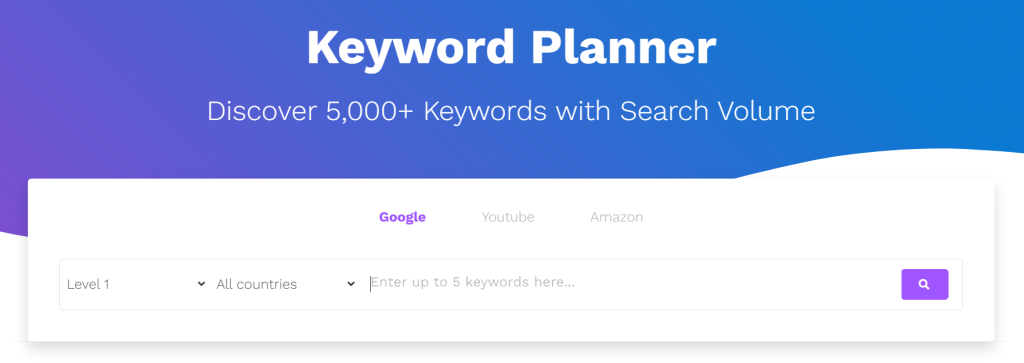
At the point when we utilized a level one inquiry to investigate just one keyword “seo”, Keyword Planner returned an incredible 1267 suggestions, that is more than 120 pages. But the catch is that you’ll have to sign up for a Keywords Everywhere API key to see every keyword’s month to month volume, Google Ads CPC, Google Advertisements competition and the general pattern.
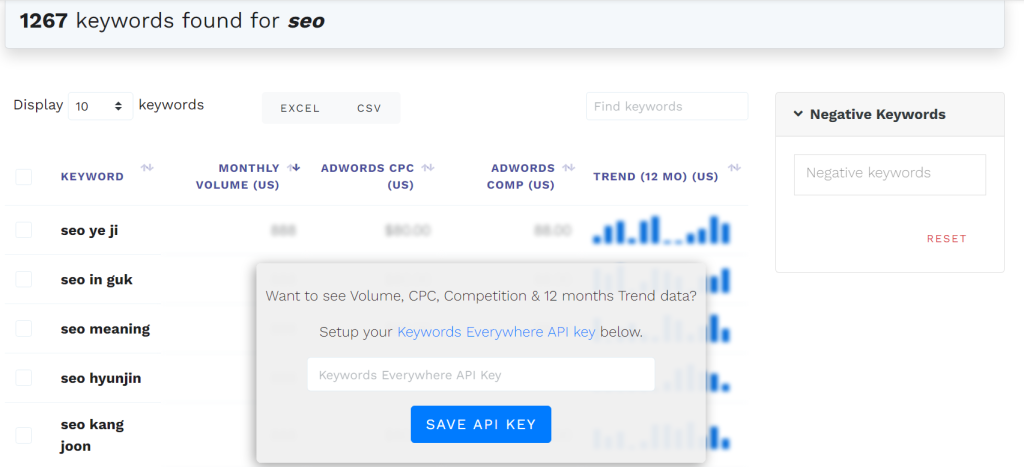
Google Trends – Free Keyword Research Tool
Although the search engine giant may not have intended for Google Trends to function as a keyword research tool, many SEO professionals use it as such. Google Trends doesn’t actually suggest keywords for you to target, unlike the tools we’ve talked about so far for keyword research. Instead, it shows how interested Google users have been in your chosen search term or topic in the past and now. For instance, we can see below that interest in the Google algorithm is at an all-time high:
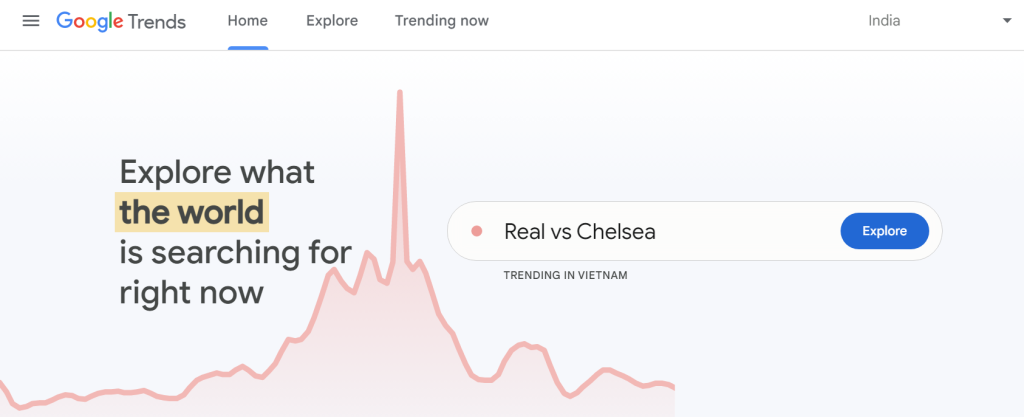

Scroll down and you’ll also see interest by subregion as well as a little selection of related subjects and inquiries. Therefore, although Google Trends will not provide you with a comprehensive list of potential keywords, it will provide you with useful insights regarding a keyword or subject matter that you already know you want to target. A map of the United States to represent various subregions and a list of related topics and queries are displayed in the Google Trends interface as seen below.
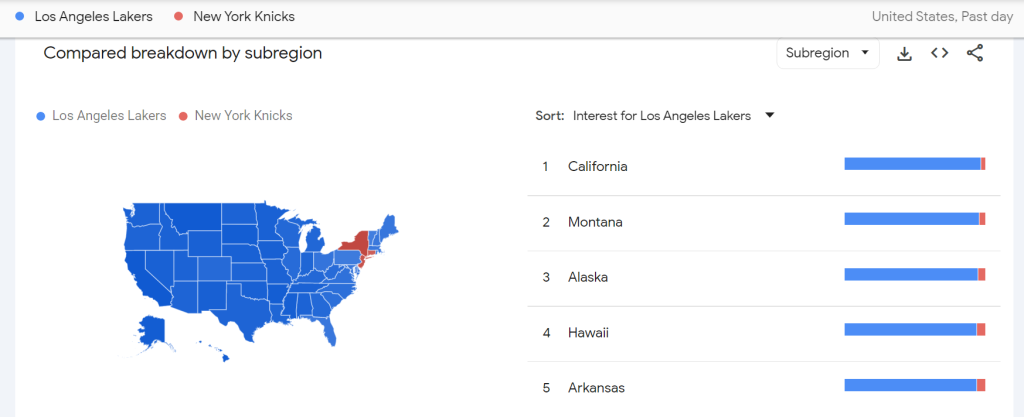
AnswerThePublic – Question Based Keyword Tool
Examining the kinds of questions that users of search engines are asking is one of the best ways to identify the relevant keywords that you ought to concentrate on. You will be able to do exactly that for free with the help of AnswerThePublic, a tool created by the CoverageBook team. You don’t have to sign up for an email list or create an account; all you have to do is type in a topic, brand, or product, select your location, and click search.

You’ll then, at that point, be welcomed with a clear visualization of the inquiries individuals are posing to about your inquiry term. A graphic from AnswerThePublic depicting the inquiries regarding the term “iPhone”.
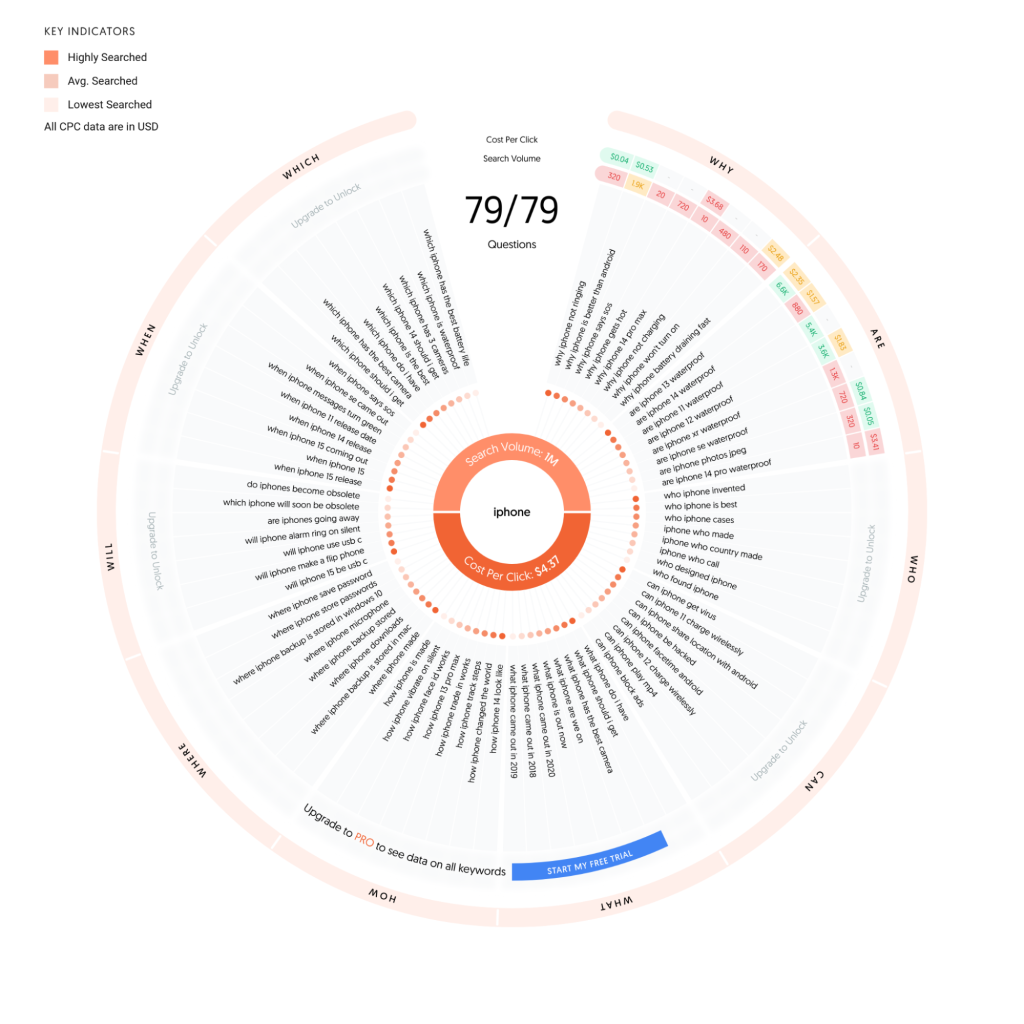
Look down and you’ll see more perceptions of applicable relational words, correlations, alphabeticals and related inquiries. If you don’t like visual representations, simply click the data tab at the top of any graph to view its contents as a collection of lists. A collection of lists produced by the AnswerThePublic tool for the query “halloween”, at the page’s top by a tab titled “Data” can be seen below.
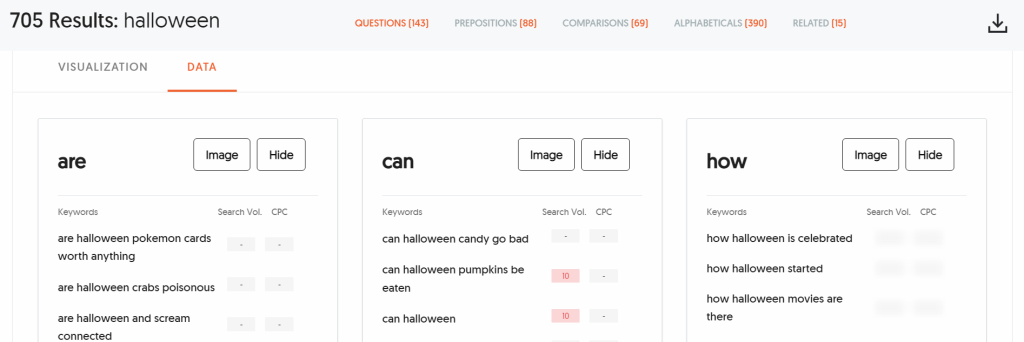
Wordtracker – Free Keyword Research Tool
Wordtracker is based in London and has been around for as long as Google. It was started in the late 1990s by brothers Mike and Andy Mindel. Although Wordtracker offers a variety of paid SEO-related products, its free keyword tool may be its most well-known offering. Enter a seed keyword or phrase and click Start to begin using it.

You will also have the option to select your preferred search engine and change your region on your results page, which will include a list of fifty keywords and the data that corresponds to them: Wordtracker’s free keyword research tool returned the following results for the key phrase “digital marketing”.
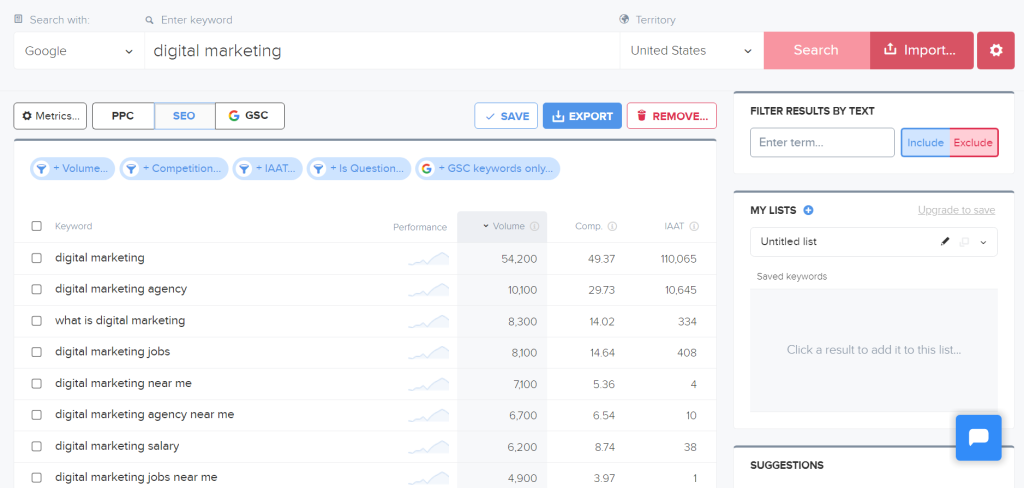
You will be able to unlock an unlimited number of searches by signing up for a seven-day free trial after using up your limited number of free searches. After that, the Wordtracker membership plan with the basic features will cost you $27 per month. While this is stretching the boundaries of the meaning of a free keyword research instrument, we believe it’s worth including. This is due to the fact that Wordtracker has a number of capabilities and features that Google’s Keyword Planner does not, such as:
- genuine (not grouped) keywords
- actual results
- metrics about rivals
- comparisons between search engine result pages (SERPs)
- live chat service for customers
- related and lateral search
- keywords for YouTube and Amazon
- negative keyword search
So assuming you’re searching for a keyword tool that has that multitude of highlights, Wordtracker’s free variant makes certain to satisfy temporarily and its paid version may likely be an ideal long term solution.
Google Keyword Planner – Free Keyword Research Tool
We would be remiss if we did not include the renowned Google Keyword Planner. It is a given that the information you get from Google Keyword Planner will be accurate and dependable because it is a tool provided by the search engine giant itself. However, there is one major limitation: You will need to sign up for a Google Ads account before you can begin using Keyword Planner. Also, to do that, you’ll have to give an email address and business site. You will be ready to go once you have created a Google Ads account.
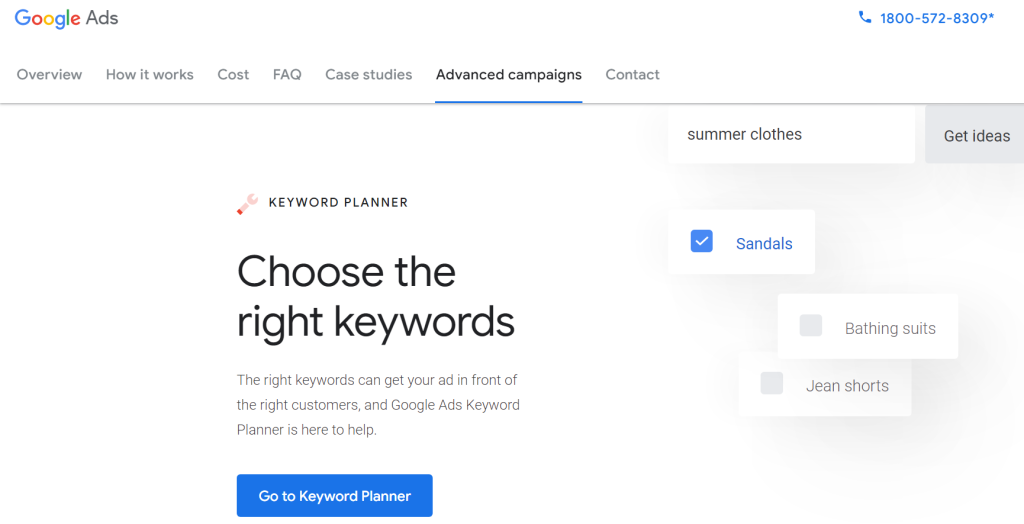
Google Keyword Planner, like many of the other tools we’ve looked at so far, suggests new keywords and provides useful information about each one. It is one of a kind because it can even be used to make a full-fledged plan and provide bid estimates for each keyword. We can see from Google’s example that a plan includes things like the expected number of conversions, total cost, CPC, conversion rate, and more. Google Keyword Planner is an undeniably powerful tool for SEO practitioners who are running or plan to run a Google Ads campaign, even if you have to go through a few hoops to use it.
Keyword Surfer – Free Keyword Research Tool
If you want to conduct keyword research without having to open a new page, this is the tool for you. This free browser extension comes from Surfer SEO, one of the best on-page optimization tools. To see how Keyword Surfer works, all you need to do is run a Google search once you add it to Chrome. You will immediately be presented with correlation charts from the top pages and a selection of keyword ideas, along with their similarity percentage and overall volume, by the tool.

Using the extension’s Content Editor, you can even create your own custom content guidelines to get the most traffic from your chosen keyword. Keyword Surfer has datasets from 70 countries in Asia, Europe, the Americas, and Oceania, so you’ll always see SEO data that’s most relevant to you and where you are. You can access the full Content Editor, which includes free WordPress and Google Docs extensions, as well as suggestions for how many headings, paragraphs, and images to include and a total “Content Score” if you opt for the full Surfer SEO app.
Keyworddit – Reddit Based Free Keyword Research Tool
If you’ve ever tried creating content for Reddit, you already know what a unique platform it is. To put it another way, SEO strategies that work well on other websites might not work at all on Reddit. That is the reason tools like Keyworddit are so important, because they are made just for Reddit, you never have to worry about whether the results will help your Reddit SEO strategy. Simply type the name of your desired subreddit into the search bar and select Get Keywords to use it.

The tool will then produce a comprehensive list of keywords from the subreddit, arranged in ascending order of search volume. For instance, the top results in the machine learning subreddit is self driving car, flappy bird game and computer science degree. Keyworddit’s list of keywords for the machine learning subreddit is seen below.
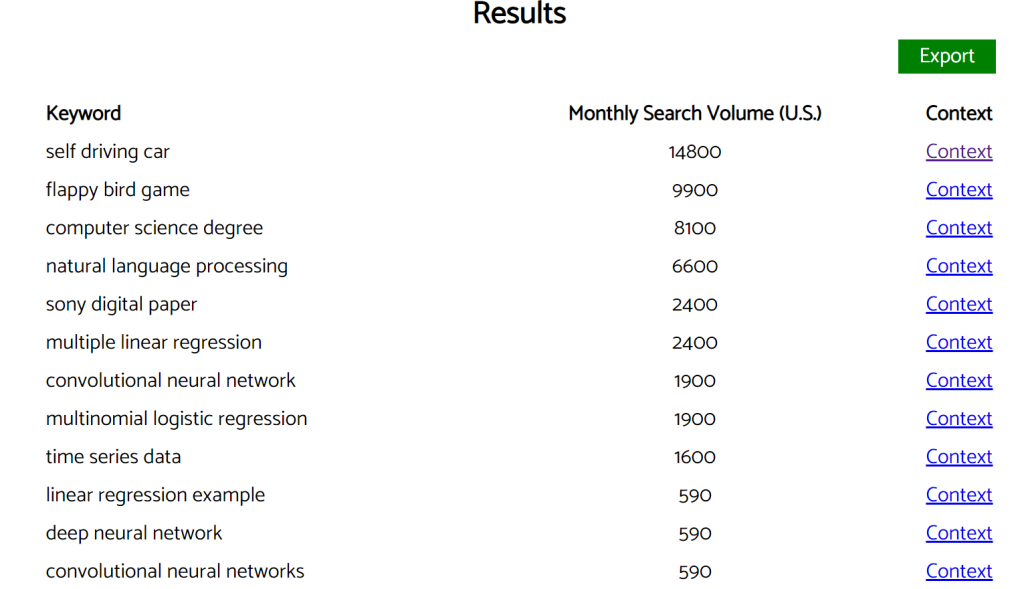
To see the particular cases of Reddit users utilizing a specific keyword, simply click context and you’ll be taken to a Google results page showing that. For instance, the results for the keyword “natural language processing” are as follows:
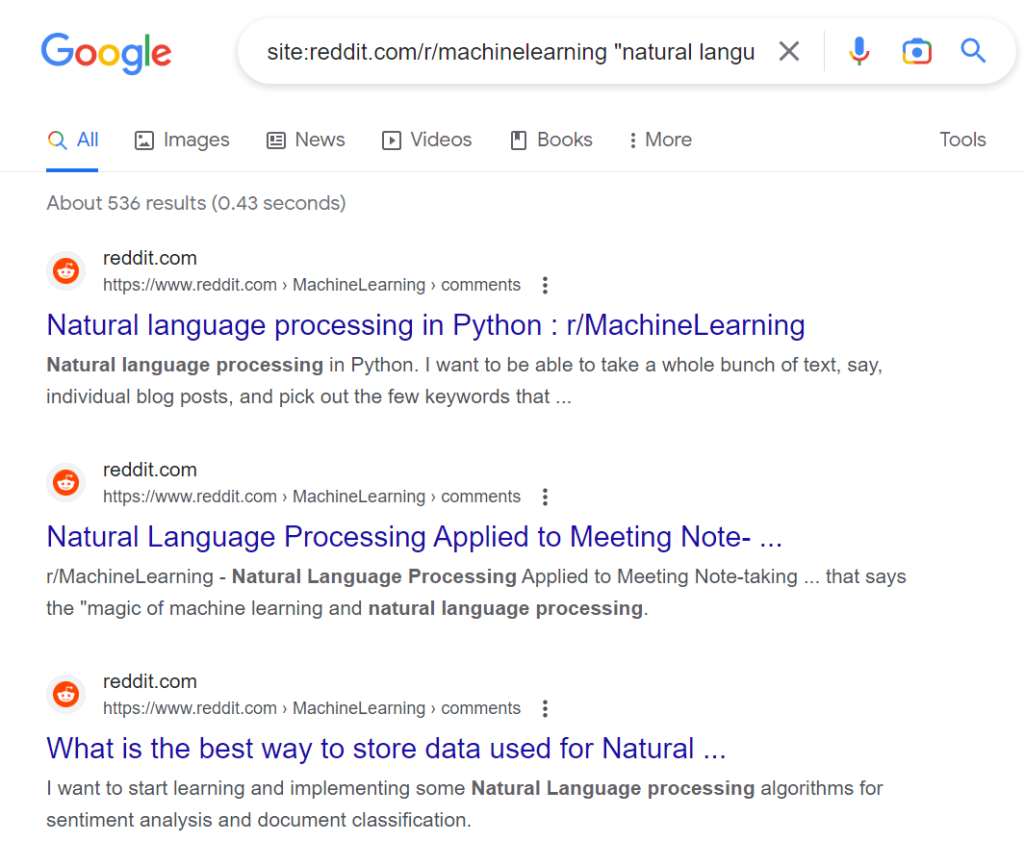
You can begin using the keywords that Reddit users actually care about with the assistance of Keyworddit, taking the guesswork out of the process of creating content.
QuestionDB – Question Based Free Keyword Research Tool
Similar to AnswerThePublic, QuestionDB goes beyond basic keyword research by focusing on specific questions. QuestionDB is a great option if you want to see more results than AnswerThePublic does. Enter the broad keyword of your choice to use it. Recipes, artificial intelligence, or electric cars are just a few examples. After that, you’ll be given fifty examples of real-life questions about your chosen subject.
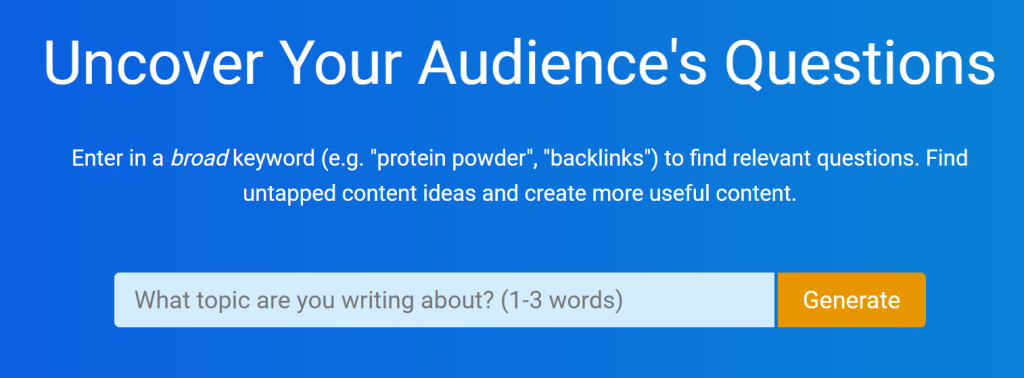
The results of the query “gardening” in QuestionDB is shown below. How does it function? “Millions of questions have been asked on various websites over time,” as QuestionDB explains. The tool “finds these ideas in real-time and returns them to you in a convenient format” when you search for a subject. To put it another way, although the questions it identifies aren’t necessarily the most frequently asked ones, they are the ones people are currently asking.
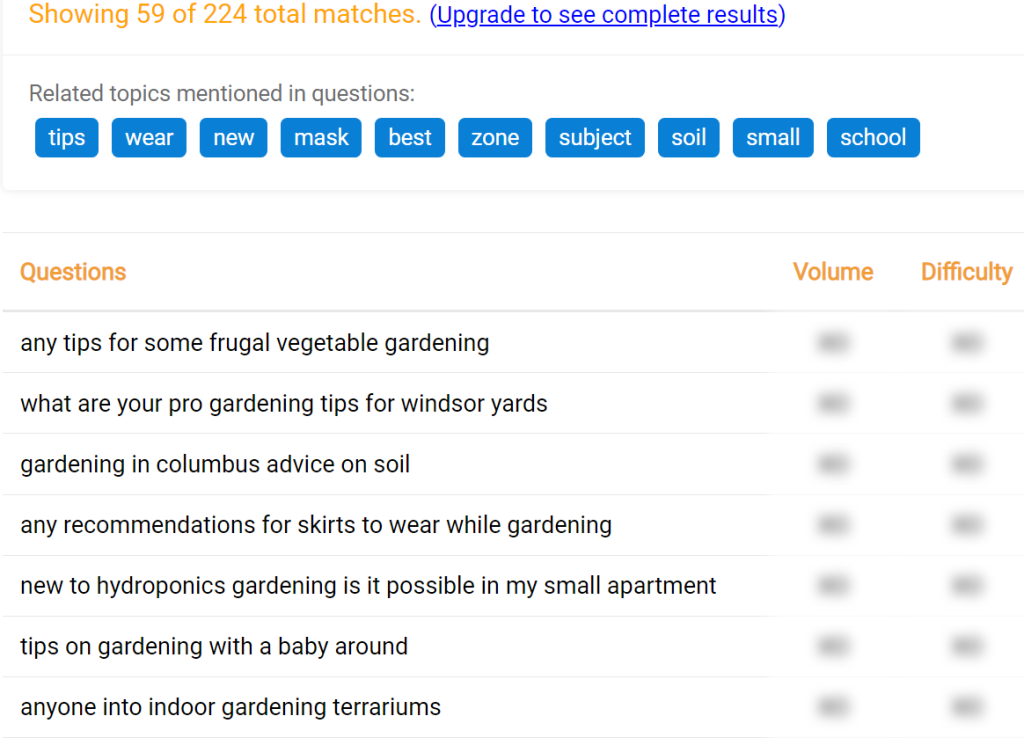
Ubersuggest – Free Keyword Research Tool
If you work in SEO, you probably already know about Neil Patel. He created Ubersuggest, a tool that gives rankings correlations, content ideas, backlink information, and more. However, for our purposes, its capacity to generate a wealth of useful keyword-related information is of the utmost significance. To utilize it, just enter your site’s URL (free users can do 3 searches per day) and click on search. After that, open the keywords drop-down menu and select one of the following options:
- overview of keywords
- keyword ideas
- similar websites
- content concepts
- keywords by traffic
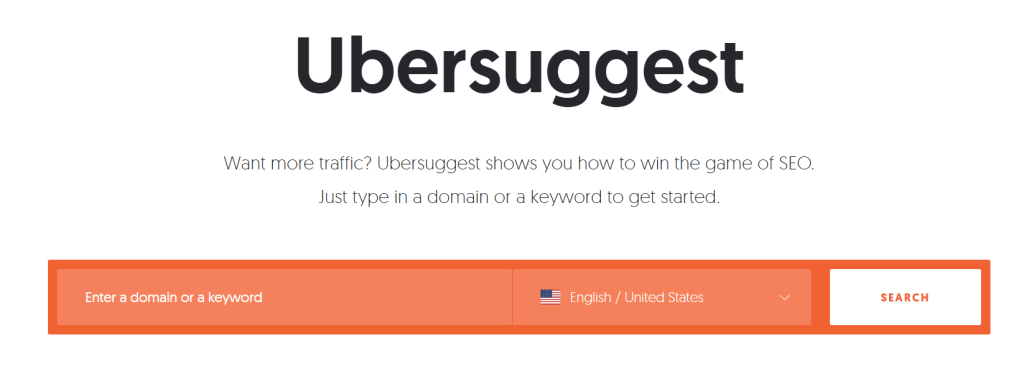
Using the option to view similar websites, for instance, we can view the most popular keywords that are driving traffic to any URL. The “Keyword Overview” and “Content Ideas” for the keyword “schema markup” is given below.

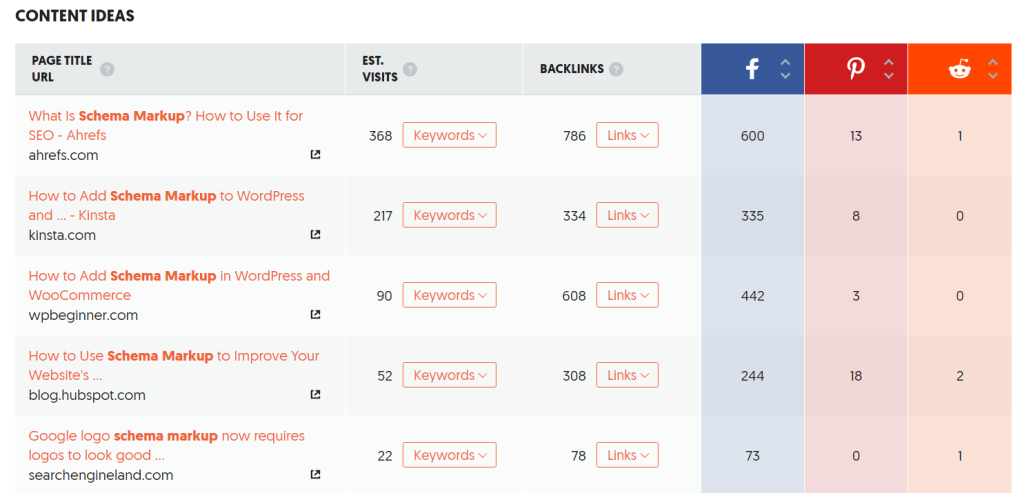
You can also download the 100% free Chrome extension if you want Ubersuggest to follow you wherever your browser takes you.
TubeBuddy – YouTube Based Free Keyword Research Tool
YouTube SEO is distinct from all other types of SEO due to its focus solely on video content. As a result, different tools are available to you for conducting in-depth keyword research. One of these tools is the free browser extension TubeBuddy, which may just be able to give your YouTube channel the edge over the competition it requires. To get knowledge about specific keywords, simply type one in the search bar and you’ll see a lot of information introduced in a simple format. That data incorporates your channel’s general score for the given keyword, interest in the keyword over the long run, related searches, and more. Reverse engineering an existing YouTube video is another option. Simply click on any of the video’s tags within the TubeBuddy extension or directly on the YouTube search results page to accomplish this.
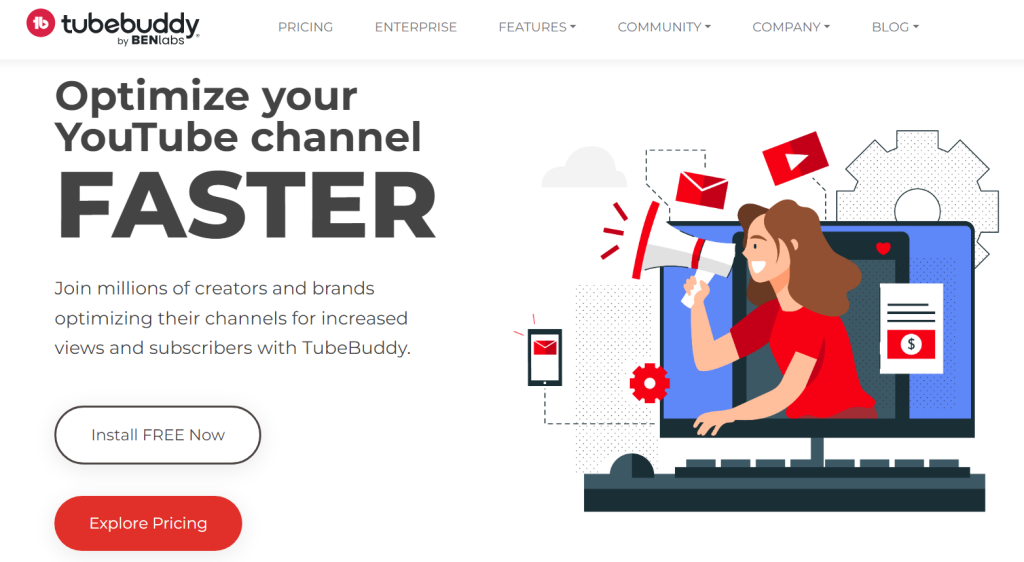
Also Read: 35 Best YouTube SEO Tools to Improve Your Youtube Rankings
Hashtagify – Social Media Free Keyword Research Tool
Hashtagify is a free social media keyword research tool that can assist you in improving your Twitter marketing strategy. Simply type the Twitter hashtag of your choice and press enter to begin. After that, you can scroll down to see a dazzling array of current data, such as popularity at the moment, related hashtags, top accounts, popularity over time, and other information. You will need to either purchase a paid plan or find an alternative tool in order to conduct research on Instagram hashtags, view information that is more in-depth, and receive custom-tailored suggestions. However, the free version of Hashtagify will more than suffice if your primary goals are to view interest by country, determine which accounts are producing the most tweets, or determine the popularity of a particular hashtag.

Semrush Keyword Magic Tool – Free Keyword Research Tool
Semrush shares a lot of keyword data and makes it easy to get the details, like SERP features like featured snippets, reviews, site links, image packs, and so on, and granular analysis of current results, if you’re looking for something more advanced. Along with the standard traffic and search volume data. It also provides content-driven keyword research and competitive keyword gap analysis tools for keyword research. One of the best keyword tools by Semrush for exploratory keyword research is the Semrush Keyword Magic Tool.
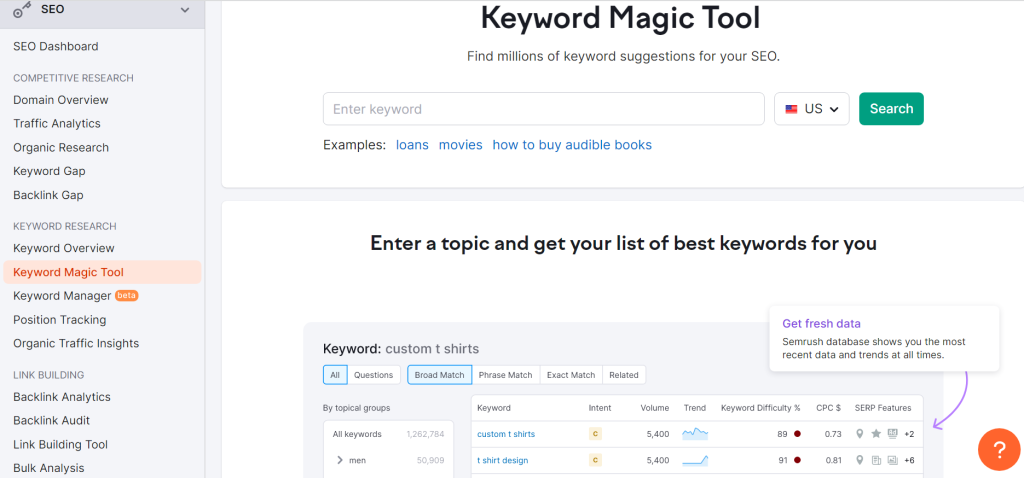
It is true that the Semrush Keyword Magic Tool allows you to search for up to ten keywords each month without spending a penny. Semrush will present you with a comprehensive list of broad match, exact match, phrase match, or related keywords after you enter the keyword of your choice. You will also be able to sort the results of the tool by monthly search volume, difficulty of keywords, competitive density, and other criteria so that you can always find the information you want. Your search will automatically be narrowed based on your new criteria once you select the options you are interested in. By including words and phrases with a high volume or popularity, you can even narrow your results.
Soovle – Free Keyword Research Tool with Multiple Sources
Soovle is the best keyword research tool if you want to see autofill suggestions from multiple widely used search engines at once. The tool will simultaneously display the search queries suggested by the autofill algorithms of seven high-traffic websites after you enter any keyword, without requiring an account. Google, Yahoo, Amazon, YouTube, Bing, Wikipedia, and Answers.com are those websites. Screenshot of Soovle’s results for the keyword “exercise” is displayed below.
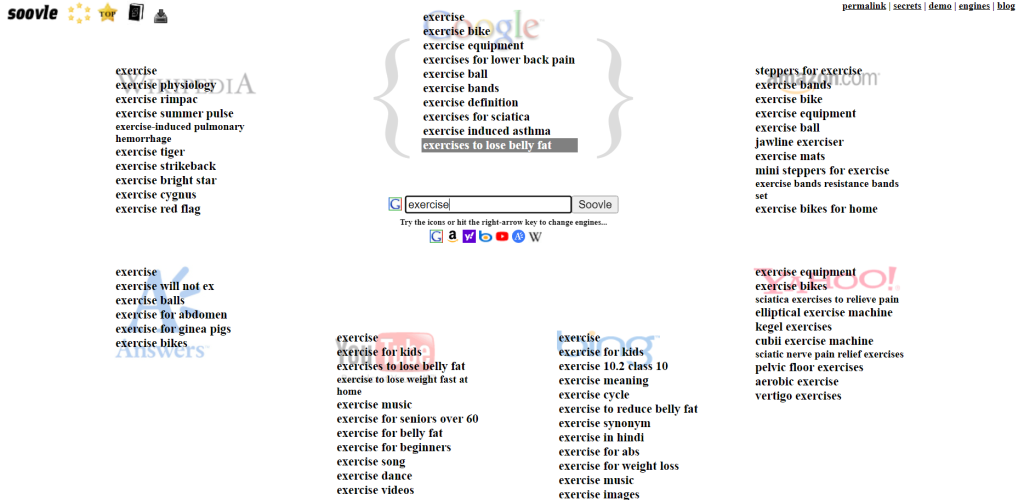
To customize which search engines Soovle displays, simply click on “engines” in the top right corner if those websites are not exactly what you’re looking for. To get results that are more in line with your requirements, you can select from a variety of options, including Overstock, Baidu, and eBay.
AdWord and SEO Keyword Permutation Generator – Free Keyword Research Tool
Have you ever wondered how many key phrases you could make from a collection of your target keywords? The AdWord & SEO Keyword Permutation Generator can tell you if you have. Simply enter three lists of keywords in the boxes provided, one keyword per line, to use it. You can make each list as long or as short as you want. Then, click the button marked Generate Permutations to see each conceivable permutation show up.
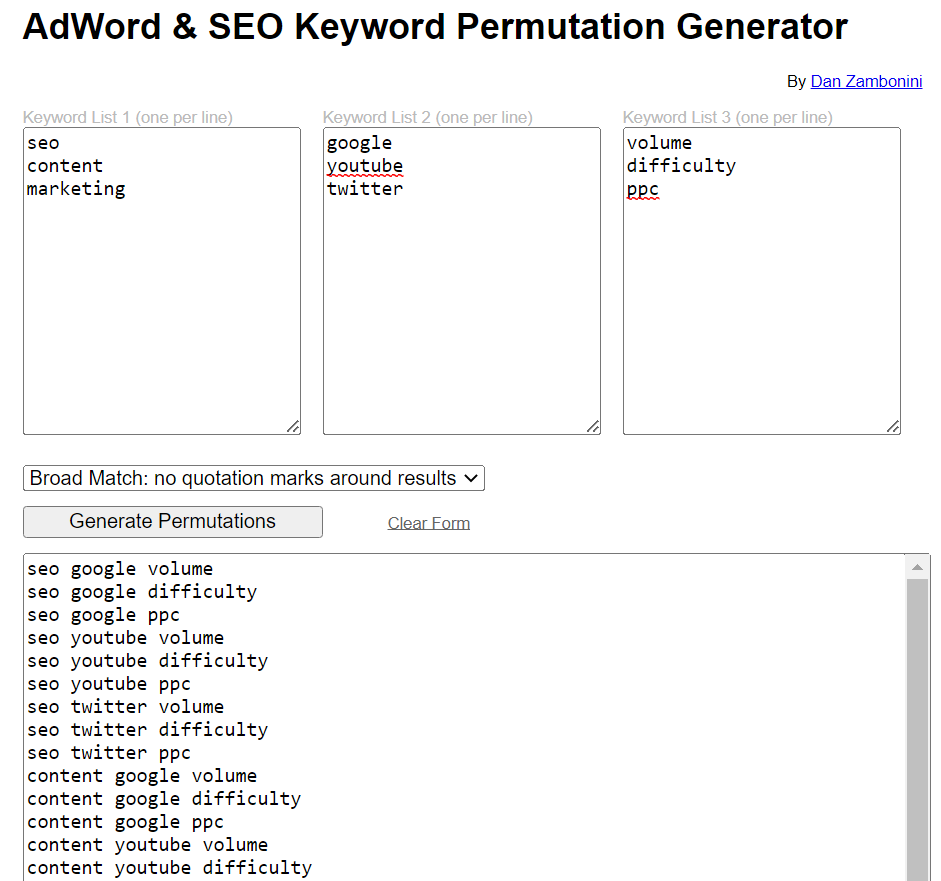
Using three lists of three keywords each in the AdWord & SEO Keyword Permutation Generator, permutations are created like seen below.
You can also use the drop-down menu to select whether you want the tool to produce broad match, phrase match, or exact match results for additional customization.
Google Search Console – Free Keyword Research Tool
You can look at your current SEO keywords’ average Google positions, impressions, and CTRs in Google Search Console. Unexpected SEO shortcuts can be discovered by looking through this research data. For instance, Google already considers your URL to be quite relevant for the keyword if it currently ranks on page two or three. Furthermore, the URL could require only a tad SEO lift to storm onto page one and begin presenting to you significantly more traffic. On the other hand you could see that a portion of your page-one positioning keywords fail to meet expectations with regards to clicks (have low CTRs). Adding the Schema markup or a little tweaking to their SERP snippets could be very helpful in solving this issue.
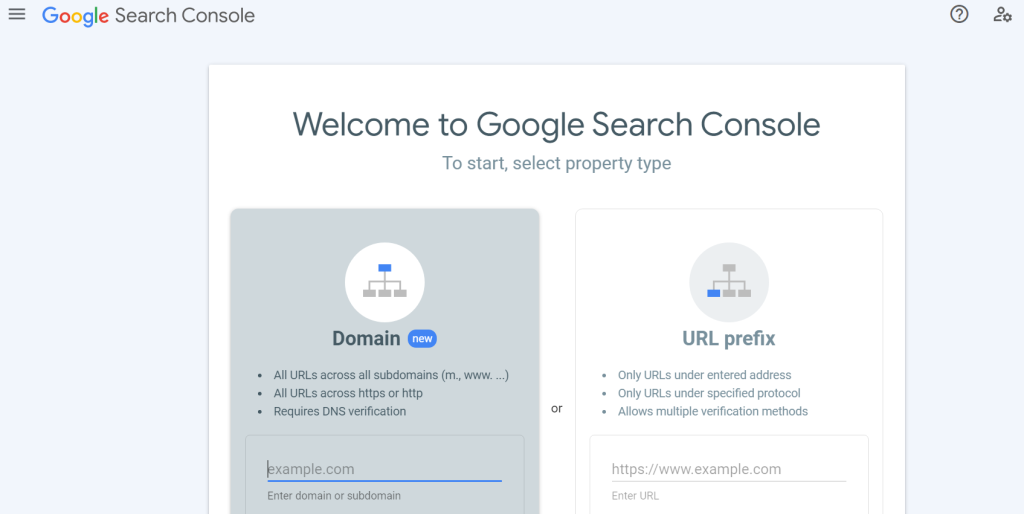
AlsoAsked – Free and Paid Keyword Research Tool
AlsoAsked compiles Google’s “People Also Ask” (PAA) data for you to analyze and use in your strategy. The PAA box is a treasure trove of questions and topics that are related to your selected keyword. AlsoAsked shows you the PAA questions related to your seed keyword and displays them on a branching diagram that shows how these related questions relate to one another. Additionally, these questions produce their own PAA results. These new inquiries are shown on extra branches. You can open a new diagram that begins at that point by clicking on one of them.
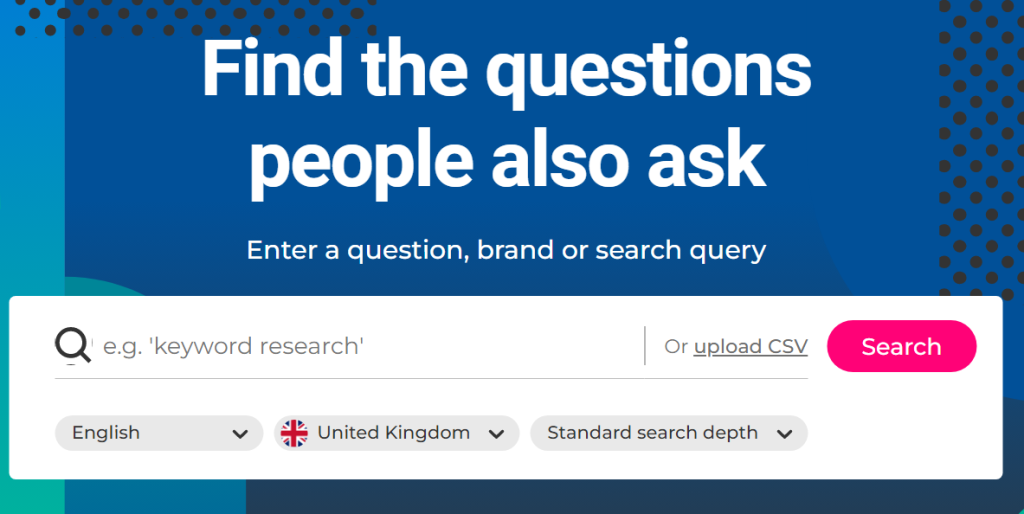
This doesn’t simply show you numerous topics you could cover. Additionally, it demonstrates the connections between these questions which can assist you with organizing your articles. You’ll be able to answer all of the most pressing inquiries in the most likely order. This data can also be exported as an image or CSV for use in analyses or presentations. You can conduct 10 searches per month with a free account. You get 100 searches with the paid plans, which start at $15 per month.
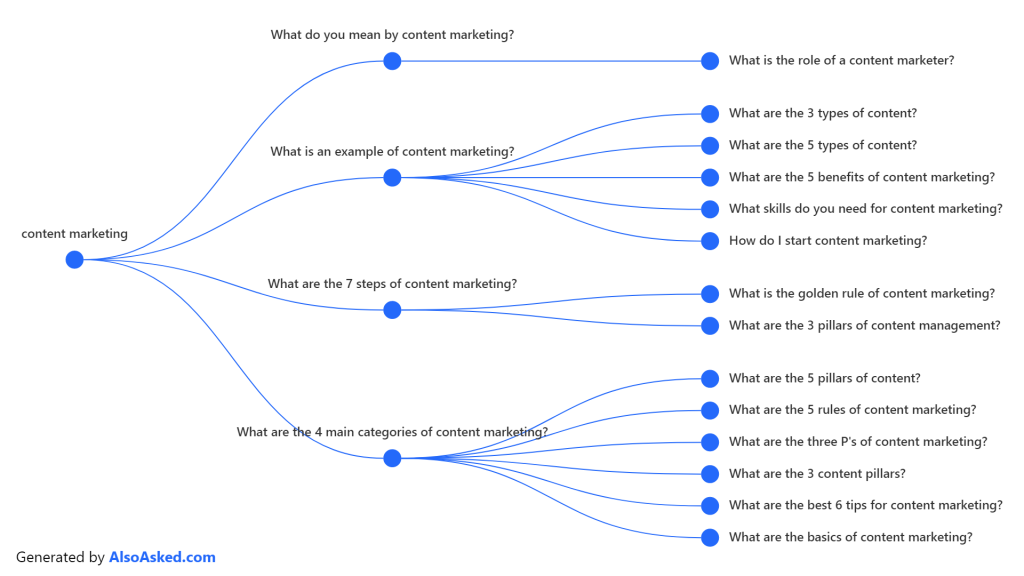
Jaaxy – Free and Paid Keyword Research Tool
Jaaxy’s keyword research tool is really simple. The tool will provide you with a list of related and suggested keywords as well as basic statistics on each (average monthly search volume and traffic to page one results) when you type in a keyword, topic, or URL. You will be impressed by Jaaxy’s assistance in locating affiliate programs to join and promote on your website. Navigate to the Affiliate Programs tab and type in your keyword to view a list of Commission Junction, Link Share, Digital River, and Click Bank affiliate programs.

Jaaxy additionally shows you the recorded commission and Alexa Rank for each program and related item site. While Jaaxy’s free plan is one of the most limited, its paid plans are a reasonable starting point for affiliate marketers who want to monetize their website. The initial 30 searches are free (with 20 results each) on the limited Starter trial plan and the paid plans start at $49 per month.
KeywordTool.io – Free and Paid Keyword Research Tool
KeywordTool.io utilizes autocomplete information from different search engines and sites including Google, Bing, YouTube, Amazon, Instagram, eBay, and the Play Store to help you find long-tail keywords, hashtags, and products. Long-tail keywords that aren’t listed in Google’s Keyword Planner are the focus of the KeywordTool.io. To start with, select the search engine and country you need to see information from. After that, enter the seed keyword. From the search engine that you have chosen, the KeywordTool.io will produce a list of autocomplete suggestions, questions, and prepositions. Click “Export” to download all of the keywords you want to target to an Excel or CSV file.

The free version of Keyword Tool does not require you to sign up for an account. For each seed keyword that is looked for, the free tool can come up with up to 750 suggestions. Monthly fees for pro accounts start at $69 per month.
Wrapping Up
Keyword research is probably the most important SEO task. Whatever objectives you have, and whatever business you run, picking the right SEO keywords lays the premise and changes the direction of your SEO campaign. Whether you are creating a blog or building an ecommerce site, each page you make takes time, energy, and mastery. So you would do well to make a point to pack your search engine optimization toolset with the best keyword research tools possible.
After all, a well-informed SEO and content strategy is built on keyword research. Use these free keyword research tools to get started if you want to get a better understanding of your audience, increase conversion rates, and reach the people who will be most benefit by your product or service.
FAQs
Is it necessary to use keyword research tools?
Without keyword research tools, finding the right keywords to use in your blog or online content to help it rank on SERPs would be like trying to throw darts in a dark room. You would occasionally hit the target, but many darts would fall to the ground. You need to know what your audience needs and for that you need keyword research tools.
Which is the best free keyword research tool?
There are many free keyword research tools available in the market. We have listed 22 best free keyword research tools in the post above.
What is the value of paid keyword research tools?
In addition to offering more results and additional keyword data, some paid keyword research tools provide location-based SEO data that are ideal for those interested in locale-based targeting. It is also much simpler to save and store your keyword research in a single location with paid keyword research tools.
Are there any limitations on the number of keywords I can research using free tools?
The limitations on the number of keywords you can research using free tools varies depending on the specific tool. While some free keyword research tools may have certain limitations, others may offer more generous research.
























